![]()
![]()
![]()
Use LEFT and RIGHT arrow keys to navigate between flashcards;
Use UP and DOWN arrow keys to flip the card;
H to show hint;
A reads text to speech;
48 Cards in this Set
- Front
- Back
|
Madrigal |
a secular vocal music composition, usually a partsong, of the Renaissance and early Baroque eras |
|
|
Aside |
a part of an actor's lines supposedly not heard by others on the stage and intended only for the audience. |
|
|
Hamartia |
Tragic flaw |
|
|
Soliloquoy |
a long, usually serious speech that a character in a play makes to an audience and that reveals the character's thoughts |
|
|
Verbal Irony |
is a figure of speech. The speaker intends to be understood as meaning something that contrasts with the literal or usual meaning of what he says. |
|
|
Situational irony |
is a literary device that you can easily identify in literary works. Simply, it occurs when incongruity appears between expectations of something to happen, and what actually happens instead. |
|
|
Dramatic irony |
the expression of one's meaning by using language that normally signifies the opposite, typically for humorous or emphatic effect. |
|
|
Blank verse |
verse without rhyme, especially that which uses iambic pentameter |
|
|
Iambic penameter |
a line of verse with five metrical feet, each consisting of one short (or unstressed) syllable followed by one long (or stressed) syllable, |
|
|
Portraiture |
: portraits of people painted or drawn by artists |
|
|
Groundlings |
a spectator or reader of inferior taste, such as a member of a theater audience who traditionally stood in the pit below the stage. |
|
|
Sonnet |
a poem of fourteen lines that follows a strict rhyme scheme and specific structure. |
|
|
Deus ex machina |
a god introduced by means of a crane in ancient Greek and Roman drama to decide the final outcome2: a person or thing (as in fiction or drama) that appears or is introduced suddenly and unexpectedly and provides a contrived solution to an apparently insoluble difficulty |
|
|
Mannerism |
a style of 16th-century Italian art preceding the Baroque, characterized by unusual effects of scale, lighting, and perspective, and the use of bright, often lurid colors. It is particularly associated with the work of Pontormo, Vasari,and the later Michelangelo |
|
|
Chiaroscuro |
the treatment of light and shade in drawing and painting.an effect of contrasted light and shadow created by light falling unevenly or from a particular direction on something. |
|
|
Reubenesque |
Of, relating to, or in the style of painting of Peter Paul Rubens. Plump or fleshy and voluptuous. Used of a woman. |
|
|
Baroque |
1.relating to or denoting a style of European architecture, music, and art of the 17th and 18th centuries that followed mannerism and is characterized by ornate detail. In |
|
|
Opera |
an art form in which singers and musicians perform a dramatic work combining text |
|
|
Overture |
music is the term originally applied to the instrumental introduction to an opera |
|
|
Recicative |
musical declamation of the kind usual in the narrative and dialogue parts of opera and oratorio, sung in the rhythm of ordinary speech with many words on the same note. |
|
|
Aria |
a long, accompanied song for a solo voice, typically one in an opera or oratorio. |
|
|
Toccata |
a musical composition for a keyboard instrument designed to exhibit the performer's touch and technique. |
|
|
Comedie-ballet |
a genre of French drama which mixes a spoken play with interludes containing music and dance. |
|
|
Oratorio |
a large-scale musical work for orchestra and voices, typically a narrative on a religious theme, performed without the use of costumes, scenery, or action. W |
|
|
Absolutism |
A political theory holding that all power should be vested in one ruler or other authority |
|
|
Divine right of kings |
kings derive their authority from God, not from their subjects |
|
|
Palace of Versailles |
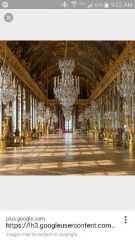
a royal château in Versailles in the Île-de-France region of France. |
|
|
Spanish armada |
The Spanish Armada was a Spanish fleet of 130 ships that sailed from A Coruña in August 1588, under the command of the Duke of Medina Sidonia with the purpose of escorting an army from Flanders to invade England. |
|
|
Elizabeth an theater |
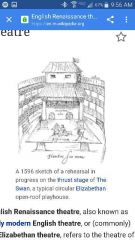
English Renaissance theatre, also known as early modern English theatre, or (commonly) as Elizabethan theatre, refers to the theatre of England between 1562 and 1642 |
|
|
English civil war & glorious revolution |
The Glorious Revolution, also called the Revolution of 1688, was the overthrow of King James II of England (James VII of Scotland and James II of Ireland) by a union of English Parliamentarians with the Dutch stadtholder William III of Orange-Nassau (William of Orange). |
|
|
Constitutional monarchy |
is a form of government in which a monarch acts as head of state within the parameters of a written (i.e., codified), unwritten (i.e., uncodified) or blended constitution. |
|
|
Absolute monarchy |
wields unrestricted political power over the sovereign state and its people. |
|
|
Rococo |
a style of architecture and decoration, originating in France about 1720, evolved from Baroque types and distinguished by its elegant refinement in using different materials for a delicate overall effect and by its ornament of shellwork, foliage, etc. |
|
|
The salon |
an assembly of guests in such a room, especially an assembly, common during the 17th and 18th centuries, consisting of the leaders in society, art, politics, etc. |
|
|
Hamlet |
the hero of a tragedy by Shakespeare, Hamlet (1603), a young prince who avenges the murder of his father |
|
|
The tragical history of Dr faustus |
Lucifer, with an offer of Faustus’s soul in exchange for twenty-four years of service from the most controversial Elizabethan play outside of Shakespeare, w |
|
|
Sonnet 37 |
Just as a decrepit father takes pleasure in seeing his active child engaging in youthful activities, so I, whom misfortune has injured and crippled, take all the comfort I can in your good worth and fidelity. For whether beauty, nobility, wealth, and intelligence—or any one of these, or all of them, or more than these—are your princely attributes, I’m attaching my love to them. I’m not lame, poor, or despised, as long as this fantasy of mine lets me take so much satisfaction in your good luck and I can live off part of your glory. Whatever is best, that’s what I wish you to have. Since I have this wish, I’m lucky ten times over. |
|
|
Elizabeth I |
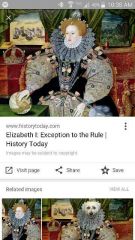
Queen of England and Ireland from 17 November 1558 until her death. Sometimes called The Virgin Queen, Gloriana or Good Queen Bess, the childless Elizabeth was the fifth and last monarch of the Tudor dynasty. |
|
|
William Shakespeare |
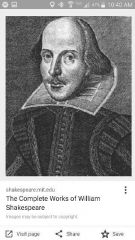
an English poet, playwright, and actor, widely regarded as the greatest writer in the English language and the world's pre-eminent dramatist.[2] He is often called England's national poet, and the "Bard of Avon".[3][nb 2] His extant works, including collaborations, consist of approximately 38 plays,[nb 3] 154 sonnets, two long narrative poems, |
|
|
Christopher marlowe |
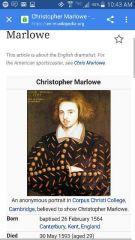
Marlowe's plays are known for the use of blank verse and their overreaching protagonists. Stabbed to death went to court |
|
|
Thomas tallies |
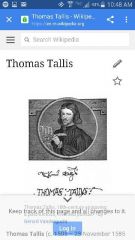
English composer who occupies a primary place in anthologies of English choral music, and is considered one of England's greatest composers. |
|
|
William bryd |
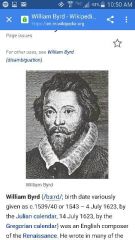
English composer of the Renaissance. He wrote in many of the forms current in England at the time, including various types of sacred and secular polyphon |
|
|
John dowland |
English Renaissance composer, lutenist, and singer. He is best known today for his melancholy songs such as "Come, heavy sleep" |
|
|
Oliver Cromwell |
Cromwell is one of the most controversial figures in the history of the British Isles, considered a regicidal dictator by historians |
|
|
Jean Baptist lully |
Jean-Baptiste Lully was an Italian-born French composer, instrumentalist, and dancer who spent most of his life working in the court of Louis XIV of France. He is considered a master of the French baroque style. |
|
|
Louis xiv |
(The sun king). His attempt to establish French supremacy in Europe, waging almost continual wars from 1667 to 1714, ultimately failed. But his reign is regarded as a golden age of French literature and art |
|
|
Caravaggio |
. His paintings, which combine a realistic observation of the human state, both physical and emotional, with a dramatic use of lighting, had a formative influence on Baroque painting. |
|
|
Gianni lorenzo |
major figure in the world of architecture, he was the leading sculptor of his age, credited with creating the Baroque style of sculpture.[2] |

